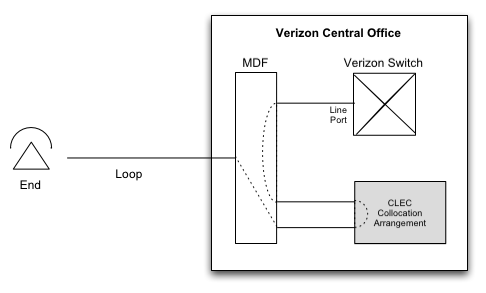| |
The Competitive Local Exchange Carrier
(CLEC) may request physical collocation or virtual collocation,
or both, in Verizon central offices except in those
that have space limitations, or where it is not technically
feasible to provide a physical collocation arrangement.
A single collocation arrangement may serve as the platform
for interconnection to Verizon Access Services and Unbundled
Network Elements (UNEs). Many CLECs are also Competitive
Access Providers (CAPs) and utilize collocation arrangements
for interconnection to access services as available
per applicable tariffs.

Typical Line Side Collocation Arrangement
In physical collocation, the CLEC occupies space within a
central office, and the CLEC installs and maintains its transmission
equipment. This is typically in a dedicated, segregated and
secured space in that office. Verizon then provides points of
interconnection between the CLEC's equipment and the Verizon
network. Once the physical interconnection is established and
tested, the CLEC buys services or UNEs from Verizon, which the
CLEC uses to provide services to its end users. The CLEC typically
has 24 hour by 7 day access to its collocation arrangement and
is responsible for the provisioning, maintenance, and repair
of its equipment.
In virtual collocation, the CLEC leases the equipment
to be collocated to Verizon for a nominal sum of $1.00
or through some other arrangement. Verizon then handles
the provisioning, maintenance, and repair of the equipment
at the CLEC's direction on a non-discriminatory
basis. Virtual collocation offers the CLEC similar benefits
as physical collocation utilizing the same equipment
that the CLEC may deploy within a physical collocation
arrangement. The major difference between physical and
virtual collocation is that in virtual collocation the
CLEC does not have access to the central office or the
equipment. The CLEC has the ability to perform remote
provisioning and maintenance of the collocated equipment.
However, the equipment is provided by and dedicated
to the CLEC and is installed by an approved vendor,
which in certain conditions may be selected by the CLEC.
(In New England, this work is done by Verizon employees.)
This section is presented to assist the CLEC in interfacing
with Verizon when ordering physical or virtual collocation from
Verizon. There are some differences in the actual collocation
arrangements between Verizon North and Verizon South . Where
differences do exist, it will reference Verizon North and Verizon
South.
This section was created to help familiarize Verizon's
collocation customers with Verizon's collocation service
offerings, ordering procedures, answers to common questions
regarding physical collocation, virtual collocation, and dedicated
transit service, and to provide guidance for Verizon and the
CLEC in implementing a collocation arrangement. The specific
rates, terms, and conditions of a collocation arrangement are
detailed in the various tariffs on file with state commissions
or the Federal Communications Commission (FCC).
|
|
| |
The Verizon Wholesale Markets Account
Management Team serves as the gateway for interfacing
to the many different organizations the CLEC interacts
with during the implementation and operation of the
collocation arrangement.
The Verizon Collocation Implementation Team is responsible
for coordinating the implementation of a collocation
site. This is made up of Verizon Collocation Program
Managers and the Local Collocation Coordinators (LCC).
Upon receipt of a collocation application, the LCC facilitates
a site implementation meeting with the CLEC to review
specific and technical implementation questions and
details, and works with the CLEC to implement each collocation
arrangement.
Collocation processes (i.e., service ordering, provisioning,
maintenance, billing, etc.) generally mirror contemporary
access practices and procedures. Collocation serves
as a platform for interconnection to Verizon's
access services and Unbundled Network Elements (UNEs).
|
|

